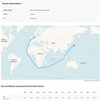Of 578 vessels visited by the UK P&I Club’s ship inspectors during 2002, the great majority were up to standard.
Some 281 ships (48.5 per cent) were given high ratings, incurring no formal comments at all on their condition or operations. Some 283 (49 percent) received some comments and suggestions for improvement, mostly on service and maintenance, and on safety standards.
Only 14 vessels---five general cargo ships, four bulk carriers and five container ships---required full condition surveys under the Club Rules. This was just 2.5 per cent of the total inspected. One has since been scrapped, three remain in breach of the Rules with repairs not completed within the time specified, four have been fully cleared, one cleared provisionally and five remain under survey. Inspections were over five per cent up on 2001 while the proportion incurring no comments at all rose by a similar percentage. Total inspections since the program started in 1990 reached 6,720.
These findings were revealed in the UK Club’s 2002 Ship Inspection Report, presented to directors. Members can tap into their own ship visit records on the UK Club’s restricted access website and compare their figures with the Club’s overall and ship type averages.
Inspections took place in the Netherlands, the USA, South Korea, China, Taiwan, Italy, India, Egypt, the United Arab Emirates and Singapore.
About one-third of visits were to bulk carriers, around 18 per cent to tankers, nearly 16 per cent to containerships and nine per cent to general cargo vessels. This represented an above average proportion of bulkers and containerships and reflected inspectors’ past reports and claims experience.
According to Karl Lumbers, the UK Club’s Loss Prevention Programme Director:
“Recent ship disasters, terrorism, the zeal of port authorities, the level of claims settlements and cyclical rises in insurance costs mean that owners, charterers and operators are up against it on political, legal and economic fronts.
“In such a context, the role of the Club’s ship inspectors is becoming even more important. It is in everyone’s interests that claims incidents are reduced and that ships operate to full commercial potential.
“Ship inspectors’ advice not only draws attention to shortcomings which might cause incidents but helps to pre-empt detentions from port state control.”
All ships over ten years old are subject to condition survey to enter the Club. During 2002, files were opened on 288 ships (255 in 2001), of which 89 (94 in 2001) were subject to recommendations for repairs. Thirteen ships were considered unsuitable for entry following survey.
There were further surveys of entered ships where deficiencies were revealed during claims handling, where serious defects were noted by ship inspectors and when reactivation followed lay-up.
The ship types surveyed included bulkers (27 per cent), oil, gas and chemical tankers (21 per cent), general cargo vessels (18 per cent), and reefers, containerships, passenger vessels and ro-ros.
Some 29 per cent of safety management and cargoworthiness problems related to general cargo ships, 28 per cent to bulkers, 14 per cent to oil, gas and chemical tankers, eight per cent to containerships and seven per cent to reefers.
Recommendations for repair focussed mainly on the watertight integrity of hatch covers, cargo hatch packing channels, coaming compression bars, quick acting cleats, life saving apparatus and fire fighting equipment.
Of the 89 ships requiring repairs, 42 were over 20 years of age; all but six were classed with an IACS member; and 14 were flagged with Malta, 11 with China, eight with Cyprus and seven each with Russia and Turkey.
The UK Club was the leading P&I insurer of tankers with nearly 900 vessels on its books in 2002 and a market share of 23 per cent. Both the oil majors and independent owners and operators were well represented. Around two-thirds were crude or product carriers. The crude carriers averaged 12.6 years, marginally less than the world figure. For product carriers, an average age of 15.4 years compared with a global figure of 20.
Single hull tankers account for 307 of the total. Given the recent high profile tanker disasters, the Club has stepped up its inspection level for these vessels.
U.K. Club ships were known to have been detained by Port State Control authorities around the world at least 192 times in 2002, with 548 declared deficiencies between them. The figure should increase as further information seeps through.
Bulk carriers accounted for some 40 per cent of detentions---twice their Club entry proportion. General cargo ships also had detention rates which compared unfavourably with their total entry while oil and chemical tankers and passenger ships had relatively good records.
The most frequent sources of PSC detentions arose from oily water separators, lifeboat equipment, fire fighting equipment, ISM shortcomings, officer certification, cargo hatch and hold deficiencies, maintenance of ships’ equipment and accommodation, navigational charts, weather deck structure, statutory certification, fire flaps and life saving apparatus.
The inspectors were again particularly concerned about the lifeboat deficiencies, the increase in officer certification problems----possibly due to STCW 95 coming into force----and hatch cover and hold shortcomings. However, only three ships were apparently detained for pollution response plan deficiencies.
The inspectors are working on a system for advising members about their ships’ exposure to PSC detention.
Subscribe for
Maritime Reporter E-News
Maritime Reporter E-News is the maritime industry's largest circulation and most authoritative ENews Service, delivered to your Email five times per week










